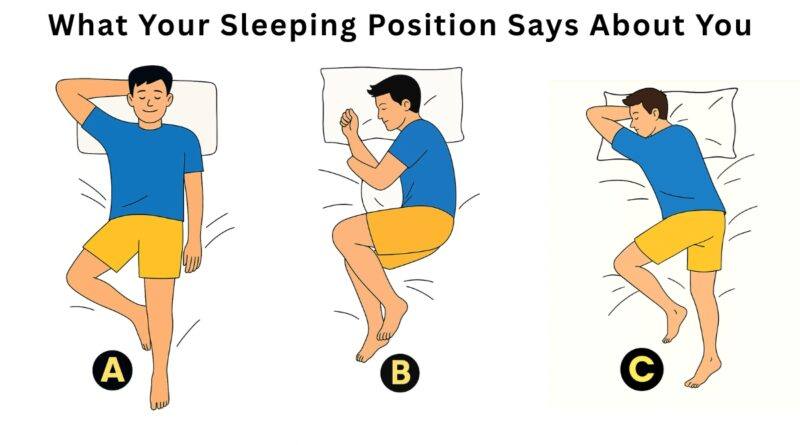Amazing Sleep Positions That Will Make You Think
WFY Bureau Desk | Lifestyle | August 2025
What Your Sleeping Position Says About You
Sleep is not just a daily necessity, it’s a deeply personal experience shaped by our minds, bodies, and emotions. While nutrition, exercise, and mental health get a fair share of the wellness spotlight, sleep often slips through the cracks, discussed in terms of quantity but rarely in terms of quality or posture. Yet, growing research suggests that our sleeping position might quietly reflect some of our deepest personality traits.
A century after Freud explored the subconscious, psychologists and sleep researchers are turning their gaze to the bedroom, not to analyse dreams, but to observe posture. Are you curled up on your side, spread like a starfish, or lying stiff on your back? These postures, say scientists, are more than physical habits, they may be subtle indicators of how we think, feel, and relate to the world.
In a series of international studies, including findings published in the European Journal of Personality, sleep postures have been shown to correlate with stress response, emotional regulation, and even career choices. Sleep researcher Samuel Dunkell, author of Sleep Positions: The Night Language of the Body, argued that the way we position ourselves when unconscious may reveal more about us than we realise while awake. “The way we sleep is the way we live,” he famously said.
Let’s explore the three most common sleeping positions and what they suggest about who you are beneath the surface.
A. Sleeping on Your Back: The Stoic Dreamer
Sleeping on your back is considered the most balanced and symmetrical of all sleeping positions. Medically, it’s known to support spinal alignment and reduce acid reflux, but psychologically, it often corresponds to self-assured, principled individuals.
People who sleep on their backs typically exude a quiet confidence. They are composed, reflective, and less prone to emotional outbursts. They tend to be goal-oriented, with a preference for structure and order. Their inner world is not easily shaken, and they do not indulge in unnecessary drama or gossip. In public, they often appear regal or controlled, sometimes even aloof, but this comes from a place of mental discipline rather than arrogance.
Interestingly, those who sleep in a posture known as the “soldier,”arms down by their sides, legs straight, are often introverted perfectionists. They carry themselves with dignity and tend to keep their private life close to the chest. Their approach to relationships is cautious but loyal. They may not be emotionally expressive, but when they commit, they do so with their whole self.
Those who sleep like this are often found in leadership roles or professions requiring immense concentration and responsibility, such as:
- Judge
- Surgeon
- Architect
- University Professor
- Financial Analyst
- Military Officer
- Diplomat
- Entrepreneur
Statistical insight: According to a 2023 survey by the Sleep and Wellness Institute (UK), only 8% of adults reported back-sleeping as their preferred posture, but among them, over 65% held decision-making roles at work.
B. Sleeping on Your Side: The Empathetic Anchor
Side sleeping is the most common sleeping posture globally, with nearly 60% of people identifying it as their natural preference. Medically, it’s recommended for those with sleep apnoea or snoring tendencies and is also considered ideal during pregnancy. But beyond physical benefits, side sleepers tend to be emotionally intuitive, adaptable, and loyal.
There are sub-variations within side sleeping that reveal even more. People who curl up in the foetal position, for example, often present a contrast between outer toughness and inner sensitivity. They are cautious in new environments but form strong emotional bonds when they trust. They prefer a cocoon of emotional safety and tend to be deeply introspective.
Those who sleep straight on their side with legs extended and arms either close to the body or slightly forward often appear more open and agreeable. They are social and enjoy group settings, but also need regular moments of solitude to reset.
A fascinating sub-group are the pillow huggers—individuals who sleep with their arms wrapped around a pillow or with one tucked between their knees. These sleepers are typically nurturers at heart. Family-oriented, dependable, and emotionally intelligent, they are the kind who remember birthdays, send handwritten notes, and always offer a shoulder to cry on. In a world driven by achievement, they choose connection.
Such personality traits lend themselves to professions rooted in care, communication, and people management:
- Nurse
- Therapist
- Social Worker
- Teacher
- Human Resources Manager
- Public Relations Specialist
- Customer Service Manager
- Event Planner
- Life Coach
Notable trend: A 2022 report by the International Sleep Foundation found that side sleepers scored highest in empathy-based psychometric tests and were more likely to prioritise relationship stability over career progression.
C. Sleeping on Your Stomach: The Bold Free-Spirit
The stomach sleeper is something of an outlier, both physically and psychologically. While this position can increase pressure on the spine and isn’t generally recommended by medical experts, those who favour it often exhibit traits of boldness, spontaneity, and expressive living.
These individuals tend to dive headfirst into experiences. They are often labelled as straight-talkers, not fond of sugar-coating, and unafraid of confrontation. Their world is fast-moving, filled with curiosity, and driven by instinct. While some might see them as impulsive, they are often deep thinkers in disguise, covering their vulnerability with humour or confidence.
According to Samuel Dunkell’s research, stomach sleepers are prone to control-oriented thinking. They dislike uncertainty and may display signs of anxiety when things go off-script. And yet, they bounce back faster than most, relying on grit and wit to navigate life’s unpredictability.
The personality of the stomach sleeper aligns well with fields where creativity, adaptability, and performance under pressure are prized:
- Journalist
- Travel Blogger
- Athlete
- Stock Trader
- Advertising Manager
- Sales Executive
- Filmmaker
- Public Speaker
Behavioural data: In a behavioural study conducted across four countries (UK, Germany, Japan, and India) in 2021, stomach sleepers showed higher levels of risk-taking behaviour and were 35% more likely to change jobs or careers within five years compared to back or side sleepers.
The Cross-Sleeper: A Blended Identity
Not everyone has a fixed sleeping position. Some people shift during the night, moving from back to side or side to stomach. These are the adaptive sleepers, individuals with multifaceted personalities who can transition smoothly between roles in both professional and personal life. While one might call them indecisive, they are better understood as emotionally flexible and context-sensitive.
These sleepers tend to do well in hybrid professions or dynamic settings, often described as:
- Versatile
- Intuitive
- Balanced
They are good team players, yet capable of independent thinking, and often act as bridges in conflict or collaborative settings.
What Influences Our Sleeping Position?
Several factors influence how we sleep:
- Childhood habits: Sleep positions often trace back to comfort cues developed in early years.
- Emotional state: Stress, loneliness, or depression may affect posture.
- Physical condition: Pain, pregnancy, or age can shift preferences.
- Personality shifts: A longitudinal study from Finland (2020) found that changes in personality traits over time could alter one’s dominant sleep posture, especially during periods of life transition (e.g., divorce, job change, or bereavement).
Sleep as Self-Awareness
We spend nearly one-third of our lives asleep, and yet we rarely pause to reflect on the form we take in that stillness. Whether you curl up like a child, lie stretched like a ruler, or bury your face into the pillow, your body may be revealing parts of you that your waking self keeps hidden.
Understanding your sleep position is not about boxing yourself into a type, it is an invitation to observe, reflect, and appreciate the silent rituals of the self. In knowing how we rest, we may better understand how we relate, decide, love, and live.
Disclaimer: This article is intended for general information purposes only and does not constitute medical or psychological advice. For concerns related to sleep disorders or mental health, please consult a qualified professional.




